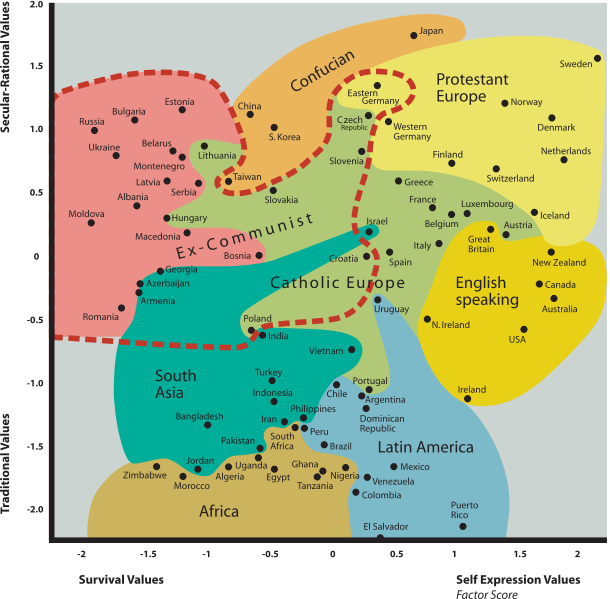I recently wrote about Benkler’s 2002 claim that “commons-based peer production” or the “networked information economy” could enhance the liberal values of democracy, equality, freedom, and innovation and the corollary that “intellectual property” is a barrier to peer production, thus to realizing these gains. More riffing on Benkler’s papers forthcoming, but that post also serves to kick off a series I’ve long meant to do — looking at IP (take your pick: intellectual property, intellectual/industrial protectionism, inequality promotion, information/innovation policy) and commons from the perspective of various general characterizations of, take your pick: ethics, morality, politics, values. These posts will be rather naive, reflecting in some proportions the generally ignorant nature of what passes as discourse on IP and my ignorance of wide swaths of discourse. I appreciate efforts from others to correct both.
You’ve probably seen a plot of cultures on the dimensions of traditional/secular-rational values and survival/self-expression values, from World Values Survey data, but here it is again:

Definitions, excerpted from Wikipedia:
Traditional values emphasize the importance of religion, parent-child ties, deference to authority and traditional family values. People who embrace these values also reject divorce, abortion, euthanasia and suicide. These societies have high levels of national pride and a nationalistic outlook.
Secular-rational values have the opposite preferences to the traditional values. These societies place less emphasis on religion, traditional family values and authority. Divorce, abortion, euthanasia and suicide are seen as relatively acceptable.
Survival values place emphasis on economic and physical security. It is linked with a relatively ethnocentric outlook and low levels of trust and tolerance.
Self-expression values give high priority to environmental protection, growing tolerance of foreigners, gays and lesbians and gender equality, and rising demands for participation in decision-making in economic and political life.
How do the current IP regime and treating knowledge as a commons align on these dimensions?
Property seems aligned with traditional and survival values:
- Deference to authority: literally, deference to those legally recognized as authors, practically, deference to highly capitalized intermediary “owners” who define culture through mass marketing.
- Traditional family values: highly capitalized intermediaries are often willing accomplices in promoting, and suppressing other values.
- Nationalistic: those foreign pirates!
- Economic security: tropes of caring about starving artists and their descendants, and the centrality of the assumption that knowledge would not be created without property and of showing off how much “economic activity” industry generates.
- Low levels of trust and tolerance: previous assumption, and want to control unauthorized adaptations and uses.
Commons seems aligned with secular-rational and self-expression values:
- Less emphasis on authorial and intermediary control, largely debunking and struggling against these.
- Non-traditional, unintended, global uses welcomed as beneficial: sources of decentralized innovation.
- Outré uses seen as relatively acceptable, not to be suppressed by dominant intermediaries or legal persecution.
- Cultural environmentalism, knowledge ecology threatened by enclosure rather than inadequate incentive.
- Tropes of participatory culture, democratized innovation, commons-based peer production as a means of enhancing liberal values of democratic discourse, individual autonomy, equality.
I didn’t include religion above because it plays little role in contemporary IP discourse, but historically I’d place it solidly with Property, thus furthering its alignment with traditional values — religion has been a and often the primary enforcer of control and exclusivity over knowledge from the dawn of civilization.
Clearly above is a motivated characterization. Please attack it. Three obvious starting points:
- Commons advocates look back fondly on gift exchange in traditional cultures. I don’t think this will be a fruitful attack, as gift economy does not align with traditional or survival values as used in the World Values Survey. But you could construct a tenuous multi-step argument.
- Jurisdictions with stronger enforcement of intellectual property tend to have populations with secular-rational and self-expression values, relative to those with weaker enforcement.
- Property, through its support for centralized control and highly capitalized intermediaries, is exactly what destroys traditional and survival values, even if relying on same for legitimacy, and needing to strike occasional bargains with traditional values advocates.
Perhaps these amount to claim that commons expressively aligns with secular-rational and self-expression values, but property instrumentally aligns with same. This largely brings us back to theory and facts: does property or commons maximize innovation? But, what about freedom and equality as desiderata of innovation policy? I conclude for now that the current IP regime aligns with traditional and survival values and knowledge commons with secular-rational and self-expression values.